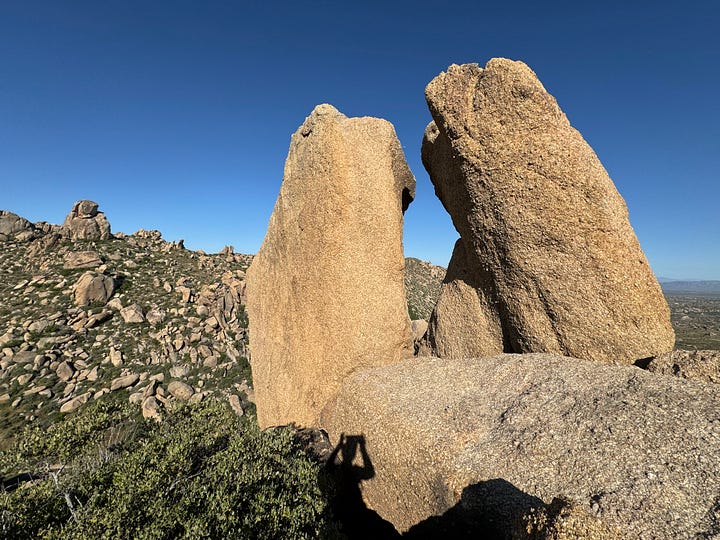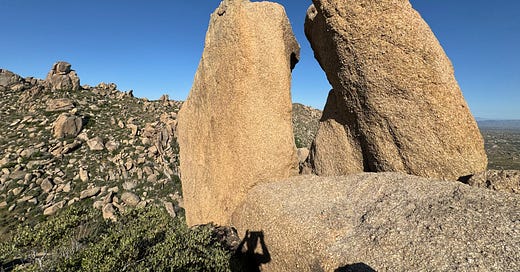Real life > Online Life
Nature as an antidote to screens, The Cass Report, and a return to birth-sex identity
What’s on my mind…
You can now watch or read this section of the newsletter. The YouTube version is here, and the text version is directly below the embedded video.
Nature as a Curative for Screens
What is it about an online life that attracts and locks certain people into a screen-based existence? We know that tech companies work to deliberately steal our attention and seek to capture more and more of it each day. But I suspect the vulnerabilities we have depend on our personalities, interests, and the medium vying for our attention. Why are some of us obsessed with twitter, but never use instagram? Why does YouTube rack up hours of one person’s day, while LinkedIn occupies none of his time? It would be fascinating to see some data on this since we all exhibit such different online and screen-based behaviors.
But what about the antidote to this? If I, or you, or your kids, would benefit from getting offline, is there one strategy that would be good for all of us, regardless of how we use our devices?
I think nature provides the answer.
As you might guess, between co-hosting the podcast Gender: A Wider Lens, producing videos for my Parent Membership Group, writing Substack Newsletters like this one, and working with parents and adolescents virtually, I’m almost constantly glued to my screen. More than that, I’m deeply immersed in a fully-cerebral world of ideas, dialogue, and language in the projects of my work. So, whenever I can get out of my head and into my body, this is a life-saver for me.
Living in Arizona, one of the most remarkable gifts we have is the opportunity to get outdoors: and to get outdoors in a way that feels transformative, almost dislocating us from time and space. Last weekend, we hiked a particularly gorgeous trail for the first time. The Tom Thumb trail, despite being just a short drive from our home, looked like a step back into time, as though this remote landscape had been unchanged for thousands and thousands of years. On the two hour hike, we kept encountering remarkable new scenes, with every turn and elevation change offering us something novel and awe-inspiring to see. Though my cell phone was in my pocket, I felt eons away from the subjects which occupy my brain most of my waking hours.




This fresh perspective, while serving as a temporary escape, also seems to sharpen my mind by giving me some distance and allowing me to consider recurring issues from a different vantage point. It’s almost like a palate cleanser for the mind. Not to mention the physical exertion which reminds us that we are alive in our bodies!
If you’re a parent trying to help your teenager or working to remain connected with an adult child; or if you’re a therapist hoping to stay sane in the face of ideology in our field; or if you’re anyone else reading this because you’ve become concerned about how we treat gender non-conforming youth, I offer you some internet jargon as a curative for the internet itself:
“Go touch grass.”
What’s on my radar…
The Cass Report
The Cass Report is the most important document produced in the assessment and evaluation of youth gender medicine to date (including 8 systematic reviews). The culmination of 4 years of research and review of all the current data, Dr Hilary Cass and her team have finally released the 388-page report. This report was commissioned by England’s National Health Service in order to guide the care of gender-distressed youth. Cass has reached some important conclusions and makes recommendations which validate much of what I’ve been suggesting since starting my practice in 2016. This report also vindicates those of us whose common-sense formulations have been vilified by radical gender activists. Here are just a few of the report’s conclusions:
the “gender-affirming approach” must come to an end
psychological distress should be treated in gender dysphoric youth just as it would be treated in any other population
social transition has significant effects on functioning and outcomes and is strongly discouraged (especially in young children)
there is no viable rationale for puberty blockers, the use of which have had unclear treatment aims and involve serious safety and health concerns, especially for female children (since their aesthetic outcomes are not improved by early pubertal suppression)
extreme caution should be applied when considering hormonal interventions (cross-sex hormones) for under 18s and there are grave concerns regarding long-term outcomes, despite short-term satisfaction when young people receive these highly anticipated interventions
gender-related surgery is never suitable for minors
While the Cass Report will be guiding the healthcare policies and guidelines in the NHS and likely throughout Europe, the US media seems either largely oblivious to this development, or outright misinforming the public about The Cass Report’s definitive conclusions. Paul Garcia-Ryan (board president of Therapy First) wrote about the Cass Review for the Washington Post, but his article was soon followed by another piece denouncing the report, written by the parent of a “gender-expansive child.” Journalist Ben Ryan also spoke to Meghan Daum in-depth about the report, which is worth a listen here. It seems that those who are deeply invested in the metaphysical belief of “gender identity” dogma will likely hold onto their deluded justifications long after they’ve been exposed.
For the full report, read here.
For SEGM’s initial summary, read here.
What’s new in my Parent Membership Group on SubscribeStar…
Topic Video: A Desistance Story - told by the young woman herself
Most of you are likely familiar with detransitioners and their stories: they are individuals who identified as trans for some period of time, began a medical process (with puberty blockers, hormones, surgery, or all of the above) and subsequently stopped taking these drugs. Some have had additional surgeries to attempt reversing the effects of the hormones or surgeries that were part of “gender-affirming care.” There are even some detransitioners who develop a deep commitment to sharing their stories and become almost-professional public speakers and campaigners against gender medicine. And we can certainly understand why: as the Cass Report firmly established, gender medicine is an industry built on shaky foundations, little-to-no evidence, and an entire theory of identity which is hotly contested. And the medical and psychological harms are real, prompting some detransitioners to take their stories public.
But what we rarely hear about are the desisters. They adopted a trans identity for some time, became convinced that they have a different gender identity and then at some point re-identified with their birth sex. You may not see these kids on major YouTube Channels or televised rallies. They’re not testifying in bill hearings or protesting outside hospitals. The kids are quietly standing in the shadows, trying to make sense of their profound identity confusion or simply trying to put it all behind them without calling any attention to themselves. Desisters, like detransitioners, might have lost years of their lives to a trans identity but have no visible scars to show it. Their scars are purely psychological, social, and internal - often invisible to others.
I was incredibly grateful to speak, in-depth, to such a young woman for this month’s Topic Video. Olivia spent several years hating her body and hating herself. She told me that in a “non-binary identity,” she found a belief system that validated all of her self-hatred and internal fragmentation. What had initially begun as a fun and playful experimentation, soon morphed into a dark, depressive fixation on everything wrong with her body and an outright rejection of womanhood.
Olivia told me how she fell into it, and how (with an incredible intervention from her parents) she slowly and incrementally pulled herself out. And this is important: when we spoke, it was the first time she’d ever talked about this experience, from beginning to end. And I don’t mean that she’s never talked to other podcasters or public figures about it: I mean she’d never ever talked in depth about what she’s been through with anyone. In a truly unprecedented display of vulnerability and openness, Olivia allows me to walk side by side with her as she pieces her story together, one question at a time.
This conversation offers listeners a completely untold story and an intimate exploration of one young woman’s desistance. If you’ve ever wondered what it’s like (from the teen’s point of view) when a family picks up and moves to a new country to help their child think clearly, heal, and release a trans identity, then you’ll need to listen to Olivia explain this roller coaster experience.
Join either tier of my Parent Membership Group Here.
Don’t forget that you can always view short clips of Topic Videos and other educational videos on my YouTube Channel.
April Live Q+A
I had an incredible guest join me for last month’s Q+A. Our guest is the father of a gender-questioning teen daughter who shares his unique, flexible, and gentle approach to gender conversations. Dad learned early on that challenging or questioning his intelligent and strong-willed teen was not doing any favors to their relationship. So he decided to use a different approach focused on finding common ground and points of agreement on the construct of gender.
His big goals for her were the following:
He wanted her to feel at home in her body
He wanted her to feel powerful and loved
The first step to helping her was to fully confront his own biggest fears: that she’d transition and regret it. By allowing himself to really imagine and accept that this might happen, he came to realize that even if this terrifying possibility was realized, things would ultimately be ok.
Moving forward, he was able to reduce his intimidation, bewilderment, and trepidation and began to fully engage this topic with his daughter using his new gentle strategy. In our conversation, Dad shares the resources and books that helped him wrap his mind around all-things-gender. He also explains how he rebuilt trust with his stubborn and determined child and began to lovingly steer her in a healthier direction while they improved their relationship.
Unlike Olivia’s parents, this Dad did not pursue the “nuclear option” but instead, looked for common ground with his daughter’s gender beliefs and focused on positive, constructive dialogue about this complicated and fascinating subject. He also delves into the importance of parents becoming “influencers” to their children, even when their kids may see things very differently at first.
If you have a very strong-willed child and are an intellectually curious parent, this will be an excellent conversation for you. Additionally, if you've been at a stalemate or engaged in debates and heated battles with your child, this guest’s refreshing perspective may spark creative new ways for you to re-engage and reduce defensiveness.
To hear this conversation, you can join the Q+A tier of my Parent Membership Group here.
If you’re the parent of a gender-questioning adolescent and you are curious about how a big change (or small incremental adjustments) might help your child, you can join either tier of my Parent Membership Group here.
What’s on my nightstand, in my headphones, or on my TV…
Bad Therapy by Abigail Shrier
I recently read the latest book from Abigail Shrier: Bad Therapy: Why the Kids Aren’t Growing Up. You likely know Shrier for her groundbreaking work, Irreversible Damage, which was the first US book to accurately describe the phenomenon of teenage girls adopting a transgender identity. This second book feels like a natural next step for Abigail, given the preponderance of “bad therapy” that becomes apparent when anyone looks into the trans teen explosion.
The book’s main theses are as follows:
Talk therapy can increase rumination, or the repetitive and unhealthy fixation on one’s problems, getting children stuck in depression and anxiety
The movement to incorporate “Social Emotional Learning” in schools, at best, is an unnecessary overreach with negative impacts on healthy children, and at worst, exacerbates mental health problems for the most vulnerable youth struggling with real dysfunction and complexity in their backgrounds
Parenting strategies like “gentle parenting” can actually create more volatile and aggressive children, leaving parents feeling out of control and desperate for therapists and other professionals to guide them.
We are working to get Abigail on the podcast, and I’m thrilled because there is so much to discuss here. I read her book in just a week or two: it’s not only an engaging page-turner, but it’s also full of valuable insights and common sense wisdom for parents and therapists alike.
I have been recommending this book to every parent I speak to lately, and largely agree with the take-home message: parents should not be reflexively taking their child to a therapist, either as a preventative measure, or when minor adolescent struggles arise.
However, I do take issue with a few points:
Abigail seems to “strawman” what actually happens in the first place. For example, when making the point that therapy can be appropriate for adults but not always for children, she gives this example: if an adult’s therapist insinuates that the patient’s parents are abusive, narcissistic or “toxic”, the adult can refute this or push back, whereas a child cannot.
I would argue that this anecdote implies that adults are robust in the face of a bad therapist, when in fact, we can look back into history and find many examples of adults being harmed by bad therapy. Furthermore, a good therapist would not make such a serious implication about one’s parents without strong evidence in the first place, regardless of how old the client happens to be.
Regarding the risk of rumination, I’m on the fence here, too. In reality, a competent therapist would be able to recognize if a new patient is prone to rumination and the work of therapy would then become to break this pattern, rather than exacerbating it. Abigail doesn’t explore this distinction. In writing Bad Therapy she seems to imply that all therapy for young people is synonymous with the bad therapeutic foibles she describes in her anecdotes.
Nonetheless, this book is timely given that the entire field of therapy has become proliferated with bad therapists. I fear that Abigail’s book (and even its blind spots) are an indicator of precisely how rare “good therapy” has actually become.
Those of you who are parents to a gender-questioning child will likely recognize many of your own stories in the book, even though she doesn’t focus on gender dysphoria much at all. Instead, you’ll notice how your child’s other mental health issues might have also been handled poorly by therapists, psych hospitals, or school counselors either preceding or after the gender distress began. Sadly, there are dozens of moments in Bad Therapy which felt all-too-familiar to me, having worked in the gender world since 2016.
I highly recommend reading the book for yourself and please let me know your opinion. Especially if you’re also a mental health professional, I’d love to know your thoughts!
What’s on our podcast…
Woah! The last few weeks have been riveting on the Gender: A Wider Lens Podcast.
Malcom Clark joins us to explore various historical ideas and concepts around gender, homosexuality, and the evolution of identity activism. This discussion navigates the intricate and contentious terrain of understanding gender non-conformity and identity expression across history. Watch or listen here.
Carrie Mendoza is back for her second appearance on the Wider Lens podcast. We dive into crucial topics surrounding medical practice, healthcare education, ethical healthcare standards and policy implementation in healthcare administration. Carrie’s insights draw from her experience with the opioid epidemic, highlighting the lessons learned about its origin, scale, and mitigation, shedding light on how these insights can inform our understanding of medicalizing radical gender ideology and preventing its harm. Watch or listen here.
Christina Buttons opened up about everything from her personal experiences with autism, her troubled adolescence, and her work as an investigative journalist, to her awakening to gender issues and her extensive research efforts. We discuss stress perception and resilience, the intersection of autism and gender dysphoria, and the lack of informed consent in medical interventions for trans identified individuals. Watch or listen here.
Rounding out the month was an incredible conversation with Tamara Pietzke, the “Unlikely Whistleblower.” Tamara’s story highlights the challenges and ethical dilemmas involved in providing gender-affirming care to children and the difficulties whistleblowers are facing in speaking out against harmful practices and the lack of informed consent. Watch or listen here.
Also, Gender: A Wider Lens is now on Substack, so please pop over and visit us there. You’ll find all the old episodes plus lots of bonus content, community discussion, and more.
I am available for one-on-one parent consultations. You can learn more about what these sessions entail, plus view my availability on my Substack.
Often I am booked quite far in advance, but if you are a Founding Member of this Substack, you will get priority booking.
In the meantime…
Here’s one thing to try…
Take a walk in nature.
If you’re reading this, you’re likely a parent of a gender-questioning child. You may, then, be tempted to encourage a screen-addicted teenager to join you outdoors. But for today, I encourage you simply, to mind your own mental health. Even for a few hours, can you put down the burden of trying to help your child and just do something good for yourself?
If you have an adult child, living out of the home, or beginning to make risky decisions around medicalization, transition treatments, or other big life choices, you will be especially in need of this advise.




